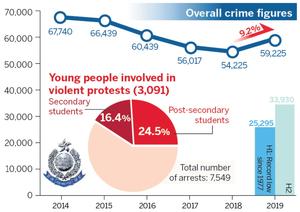
Hong Kong’s police chief and legal experts said the city’s rule of law faces a “disaster” if local people’s ignorance of the law is not addressed. The warning comes as the local crime rate has seen a 9.2 percent increase last year, fueled by anti-government protests that began in June.
Briefing the press on Monday, Commissioner of Police Chris Tang Ping-keung said he was “extremely concerned” that a society which encouraged young people to engage in street violence and then tolerated their illegal actions would see its rule of law severely undermined.
About 40 percent of the more than 7,500 people arrested for their roles in the often-violent protests were students, police revealed. Underage students accounted for 50 percent of those arrested in the first month of 2020.
Sharing Tang’s deep concerns, Barrister Lawrence Ma Yan-kwok, chairman of the Hong Kong Legal Exchange Foundation, told China Daily that the rule of law is constantly being undermined by young offenders who fall prey to radical politics and the “color revolution” agenda of some Western powers.
The surging number of juvenile offenders also indicates that education about key legal issues is ineffective in Hong Kong, said Ma. He urged residents and the opposition camp not to portray hardcore protesters as martyrs or heroes — which could exacerbate the situation.
A total of 5,000 more cases, mostly attributable to violent protests in the second half of 2019, were recorded than the year before, ending 12 years of falling crime rates, which hit a 48-year low in 2018. Many of these offenses are related to unlawful assembly, criminal damage, rioting, arson and doxxing, said Tang.
The number of burglaries, robberies, snatchings and thefts from vehicles also significantly increased as criminals took advantage of police manpower being stretched thin due to protest violence, he added.
The manpower shortage also contributed to a 9.4 percent year-on-year decline in the force’s overall detection rate to 37.1 percent for 2019.
The prolonged street violence also overburdened the police, forcing 12,000 officers to work overtime, some on duty for 50 to 60 hours in one stretch, during the social unrest. Overtime payments accounted for the roughly HK$3 billion (US$385 million) budget overrun last year, Tang explained.
Solicitor Kennedy Wong Ying-ho said Tang’s concerns demonstrated the need to allocate extra resources to the law-enforcement officers under stress. This could be the only way to avoid a disaster for the rule of law, he added.
Police should also work closely with local districts to prevent illegal activities, said Wong, noting that many underage offenders, due to inadequate legal education, could be easily misled by opposition propaganda and choose to “abide by the law selectively”.
The government, in its budget unveiled on Wednesday, allocated HK$25.8 billion to the police force, up from HK$23.6 billion last year, which includes the cost of hiring more than 2,500 additional officers. About HK$300 million will be used to purchase protective equipment and another HK$200 million for armed vehicles and water cannons to deal with increased violence.
Tang warned about the emergence of homegrown terrorism, which is characterized by the use of dangerous weapons such as explosives, guns, corrosive liquids and homemade bombs.
“We have to face the reality that there is a new normal — things cannot go back to how they were one year ago. Petrol bombs are being thrown every day against police stations and clinics. This is a very significant threat,” said Tang.



